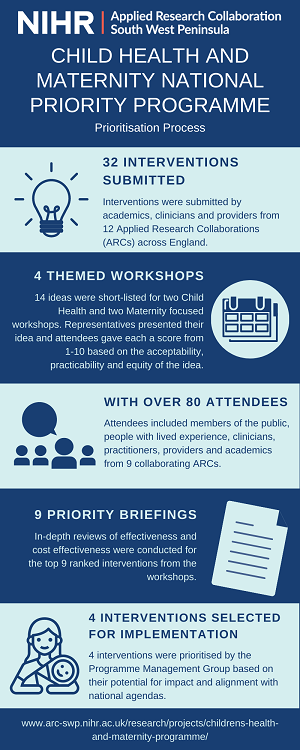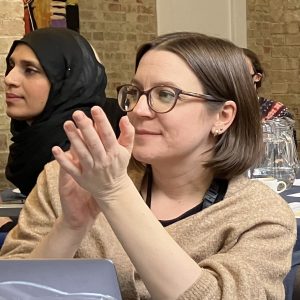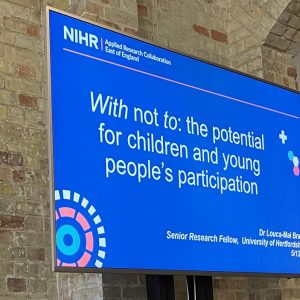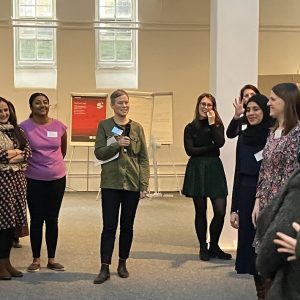We are leading the development of a research programme in Children’s Health and Maternity in collaboration with the following ARCs: Yorkshire and Humber, North East and North Cumbria, North Thames, North West Coast, Northwest London, South London, West and West Midlands.
This collaboration builds on the ARC network’s world-leading expertise in children’s and maternal health, and existing local and national networks, to best understand how research can contribute to meaningful change.
This programme of research seeks to find effective ways to implement evidence-based interventions to improve children’s and maternity services widely across England by supporting 4 implementation projects. The programme was initially funded for 3 years but has now been extended by 18 months, until June 2025. This has enabled each project to complete further research, resources and outputs. The latest information for individual projects can be found in the links below.
Prioritisation process

Through our collaborative prioritisation process, we prioritised four key projects:
- ESMI-III: The Effectiveness and Implementation of Maternal Mental Health Services
- BRUSH (optimising toothBrushing pRogrammes in nUrseries and ScHools)
- Trauma-focused Cognitive Behavioural Therapy for children in care
- Evaluating models of health-based mateRnIty Violence Advisor (RIVA) provision in maternity services
Patient and Public Involvement and Engagement (PPIE)
In support of the projects’ Patient and Public Involvement and Engagement (PPIE) we established a Community of Practice (CoP) to create a space for the projects’ academic PPIE leads, public partners and programme PPIE staff to share knowledge, resources, and experiences. We hope that working in this way will help to achieve individual project goals as well as collectively contributing to new learning for the community, building capacity in PPIE leadership and developing a network.
PPIE Progress
At initial meetings, the projects’ PPIE leads shared their PPIE practices and identified barriers to involvement and the facilitation of shared knowledge spaces, especially around sensitive subjects. We discussed the complexity of public involvement regarding the context of the research and the diversity of the people involved. CoP members identified that there is a lack of pragmatic guidance around sensitive topics within involvement spaces; and that consequently, valuable learning could be highlighted from our work and the experiences of public partners and researchers. We are now conducting an evaluation of the PPIE work across all four projects that aim to describe how to work collaboratively with public partners in a safe and sensitive way, and critically evaluate the CoP approach so others may learn from our experience.
“[I need] to give credit to the community of practice itself, and say how incredibly useful this forum is being for sharing practice and ideas and providing support. I think that communication is incredibly important and needed for PPI[E], and you just can’t do it without people.”
– Kara Gray-Burrows, Principal Investigator, BRUSH
Implementing evidence-based interventions
We are conducting a cross-project study to explore how programme teams support and influence the implementation of evidence-based interventions in child health and maternity services. Key questions include what strategies programme teams use to help project sites overcome implementation challenges, whether that support has a positive influence, how PPIE is used to support implementation, and if effective strategies are likely to be feasible for other projects.
We are completing long-form interviews with programme leads at the beginning, middle and end of the four respective projects, and monthly short interviews with programme team members. Findings from the short interviews are summarised in ‘lightning reports’ and fed back to programme teams on a regular basis to inform ongoing implementation support. These reports capture what works, what needs to be changed, and participant or evaluator insights, ideas and recommendations. Towards the end of each project, we will interview staff in selected delivery sites for each project to capture their experience of the acceptability and usefulness of the support they have received from programme teams.
We will perform a comparative analysis of the data, informed by the Consolidated Framework for Implementation Research (CFIR), and synthesise learning across all four implementation projects. This will enable us to learn generalisable lessons about the support needed for effective implementation, which could be valuable for future implementation efforts in child health and maternity settings.
Project outputs
All four supported projects will be finishing in 2025 and will be producing outputs and resources which can be viewed by the project links above and our news updates.
We are planning to share learning from each of the projects during 2025. We are particularly keen to hear from academics, healthcare providers and commissioners who are interested in our work. Please contact us with any questions or to subscribe to our mailing list to hear more about our news and events.
Read more about initial work on the projects in our past newsletters:
Upcoming Events
If you would like to hear about future events please contact us.
Related publications

A survey and stakeholder consultation of Independent Domestic Violence Advisor (IDVA) programmes in English maternity services
Download the PaperPrioritising child health and maternity evidence-based interventions or service models: a stakeholder-driven process
Download the Bite
“What works” registries of interventions to improve child and youth psychosocial outcomes: A critical appraisal
Download the PaperEnablers and barriers English secondary schools face in promoting healthy diet and physical activity behaviours
Download the PaperLinks and downloads
PenARC Staff

Dr Gretchen Bjornstad
Senior Research Fellow / Programme Manager
Professor Stuart Logan
Director of PenARC and Methods for Research and Improvement Theme Lead
Naomi Morley
Research Associate
Amy Bond
Research Associate



